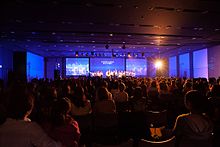Lifehouse International Church
| Lifehouse International Church | |
|---|---|
 Senior pastor Rod Plummer shares with the congregation in Tokyo | |
 | |
| Location | Tokyo |
| Country | |
| Denomination | Australian Christian Churches |
| Website | www.mylifehouse.com |
| History | |
| Founded | August 2002 |
| Clergy | |
| Senior pastor(s) | Rod and Viv Plummer |
Lifehouse International Church is a contemporary, Pentecostal, multi-site church based in Tokyo, Japan, with campuses across Japan & Asia. It is affiliated with the Australian Christian Churches (ACC). Its focus is on evangelizing to the younger generation in Japan. Rod Plummer is the founder and senior pastor of Lifehouse.
History
[edit]
Lifehouse was founded in 2002 by Rod Plummer and his wife Viv in Tokyo, Japan, with a team of 16 people. [1] They have been involved in international missions and planted churches in Thailand and Indonesia before returning to pastor an undisclosed Australian Christian Churches affiliated church in Toowoomba Queensland for 7 years. During and in the aftermath of the covid19 pandemic, preaching was consolidated to pre-recorded video preachings by Rod Plummer that were broadcast to all the church's satellite churches every Sunday.
The church was originally named Jesus Lifehouse, simplified to Lifehouse as they started to plant churches in other countries. Previously having a strong affiliation with Hillsong Church in the past, Hillsong Church has since dropped its partnership to open their own churches in Japan.
Beliefs
[edit]Lifehouse is affiliated with the Australian Christian Churches. They follow the Orthodox Creed and believe in the gifts of the Holy Spirit.[2] Geared to appeal to the younger generation in Japan, its target demographic ranges from high school to 40-year-olds, using cultural exchange and International community as a draw. Their use of social media ad campaigns and street preaching has helped them grow in numbers, though church turnover is quite high.
Some blogs, people, and mission organizations have voiced concerns in the past, most minor. A short summary follows, of which most boil down to cultural misunderstanding or failure, feelings being hurt or feeling lead onto, quick conversions, or uncooperativeness with local Japanese churches. At least from the year 2014 to present, the church has not been officially using the word sin in their preaching, as it sounds too harsh in Japanese, something only for criminals. Instead, they officially use the word or concept for mistakes, making the concept more acceptable for people. [3]
Music
[edit]Lifehouse Church produces original or original translation of worship songs under the label Lifehouse Worship. Songs are written bilingually in Japanese and English.[4]
Tohoku Homestay Relief Program
[edit]In 2011, Lifehouse Church initiated a free homestay program for school and university students affected by the Tōhoku earthquake and tsunami called Tōhoku Relief Home Stay.[5] The program was administered by Lifehouse International Church with support from American Airlines, Qantas, Air New Zealand, All Nippon Airways, Time Out New Zealand, Berlitz Language, ACC International Relief, TAFE NSW, the New Zealand Embassy, and local churches throughout Australia, New Zealand and America.[6]
A total of 210 students were sent to America, Australia and New Zealand during August and September to stay with host families and attend English schools free of charge.[7][8]
References
[edit]- ^ Denise A. Austin, Jacqueline Grey, and Paul W. Lewis, Asia Pacific Pentecostalism, Brill, Netherlands, 2019, p. 28
- ^ "What We Believe". Lifehouse International Church. Retrieved 2024-11-15.
- ^ "Do we need the word "sin"?". Eternity news.
- ^ "Lifehouse Worship". Lifehouse International Church. Retrieved 2024-11-15.
- ^ "Tohoku Relief Home Stay". Retrieved 2024-11-15.
- ^ (English), Tohoku Relief Home Stay. "Endorsements & Partners « Tohoku Relief Home Stay (English)". Tohokureliefhomestay.com. Retrieved 22 October 2017.
- ^ "Tsunami victim: NZ trip 'felt like mum's wishes'". NZ Herald. 1 August 2011. Retrieved 22 October 2017.
- ^ "Tohoku Relief Homestay program sends 62 students to U.S. during summer". Japantoday.com. Retrieved 22 October 2017.
